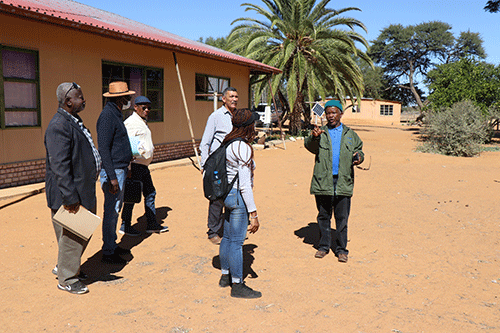George Sanzila
GOBABIS – Omaheke regional governor Pio Nganate has expressed hope that the reviewed resettlement policy, recently adopted by Cabinet, will address some of the challenges facing government’s resettlement programme.
Nganate bemoaned the slow pace of decentralisation he said has derailed efforts aimed at assisting resettled farmers in the region. As a result, he added, some farmers have resorted to subleasing their farms because they cannot afford to successfully manage them.
He is further of the opinion that the resettlement criteria needed to be reviewed to include more young people in the resettlement programme.
Nganate made these remarks when he met the Parliamentary Standing Committee on Natural Resources last Friday during the committee’s oversight visits to resettlement farms in the Otjozondjupa and Omaheke regions.
According to Nganate, the exclusion of more young people from the resettlement programme has resulted in the region having to deal with increasing and complex cases of inheritance.
“We have to deal with so many inheritance cases in the Omaheke region. The reason for this is that we are not resettling more young people that are still active and productive. There is a need to relook at the resettlement criteria,” he pleaded.
Nganate further noted that the resettlement programme lacks punitive measures for defaulting resettled farmers.
“Unfortunately, the resettlement programme has no punitive measures. Nothing addresses farmers who have been given all the necessary support but still fail to be productive and adhere to the regulations,” he noted.
The governor further called for diversification of farming activities, stating that for that to be realised, farmers needed to be capacitated and mentored through deliberate government initiatives.
He further briefed the committee that marginalised communities, such as the San, who make up over 23% of the population in the region, continue to benefit from government’s resettlement programme.
Vincent Mareka, who led the committee, echoed similar sentiments, stating that government should further consider developing virgin land for allocation and not only acquire farms.
“There is plenty of habitable land lying idle elsewhere in Namibia only needing infrastructure that can be demarcated. The same millions we are spending to buy farms could be used to develop this land for allocation,” said Mareka.
Seretse Olibile, one of the resettled farmers at Dixieland farm, criticised the lack of coordination between government stakeholders.
“We have no support from the ministries. We don’t get seeds or fertiliser. When you seek help from one ministry, you’re sent back and forth. There is no coordination and harmonisation of activities at all. I have knocked on the doors of ministries many times to no avail,” decried Olibile.
Simon Kangootui, who farms at Kaukurus 50 kilometres west of Gobabis, noted that stock theft is a major challenge in the area and that lack of cooperation from the police exacerbates matters.
He noted that as a result, resettled farmers in the area have taken the initiative to form a neighbourhood watch to deter would-be cattle rustlers. He also mentioned the lack of a market for his produce as another hindrance.
Other lawmakers included Mike Veenani and Jan Van Wyk.
The committee conducted oversight visits to resettlement farms in the Otjozondjupa and Omaheke regions to, among others, assess productivity at resettlement farms, ascertain whether there is any support offered by government in terms of financing and training, and the role played by resettlement farmers to create jobs and boost food self-sufficiency as part of efforts to alleviate poverty.
A comprehensive report will be compiled and tabled in the National Assembly for further action.
*George Sanzila works in the Division: Research, Information, Publications and Editorial Services.


